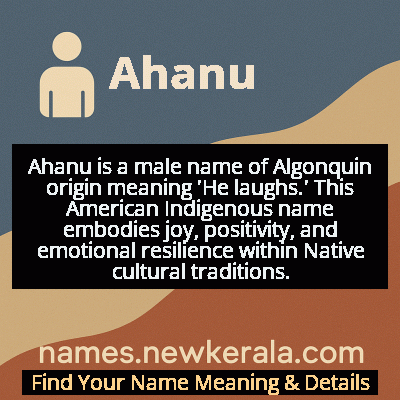Ahanu Name Meaning & Details
Origin, Popularity, Numerology Analysis & Name Meaning of Ahanu
Discover the origin, meaning, and cultural significance of the name AHANU. Delve into its historical roots and explore the lasting impact it has had on communities and traditions.
Name
Ahanu
Gender
Male
Origin
American
Lucky Number
9
Meaning of the Name - Ahanu
Ahanu is a male name of Algonquin origin meaning 'He laughs.' This American Indigenous name embodies joy, positivity, and emotional resilience within Native cultural traditions.
Ahanu - Complete Numerology Analysis
Your Numerology Number
Based on Pythagorean Numerology System
Ruling Planet
Mars
Positive Nature
Generous, passionate, energetic, and humanitarian.
Negative Traits
Impulsive, impatient, moody, and can be overly emotional.
Lucky Colours
Red, maroon, scarlet.
Lucky Days
Tuesday.
Lucky Stones
Red coral, garnet.
Harmony Numbers
1, 2, 3, 6.
Best Suited Professions
Military, sports, philanthropy, leadership roles.
What People Like About You
Courage, energy, leadership, generosity.
Famous People Named Ahanu
Ahanu Charters
Cultural Educator
Founded cultural preservation programs for Algonquin communities
Ahanu Bear
Environmental Activist
Led conservation efforts for traditional tribal lands
Ahanu Rising Sun
Artist
Renowned for traditional Algonquin beadwork and storytelling
Name Variations & International Equivalents
Click on blue names to explore their detailed meanings. Gray names with will be available soon.
Cultural & Historical Significance
The name also represents the continuity of Indigenous identity in the face of historical challenges. As Native communities work to preserve and revitalize their languages and traditions, names like Ahanu serve as living connections to cultural heritage. The name's meaning speaks to universal human experiences while remaining firmly rooted in specific cultural context, making it both particular to Algonquin tradition and broadly relatable. This dual nature has helped the name maintain relevance across generations, adapting to modern contexts while preserving its original cultural significance and spiritual depth.
Extended Personality Analysis
Individuals named Ahanu are typically characterized by their optimistic outlook and infectious positivity. They often possess a natural ability to lighten tense situations with well-timed humor and maintain perspective during challenges. Their laughter isn't superficial but stems from deep emotional resilience and an understanding that joy and sorrow are interconnected parts of life. Ahanus tend to be emotionally intelligent, reading social cues accurately and using humor to build bridges between people. They often serve as peacemakers in their communities, using their natural charm and wit to diffuse conflicts.
Beyond their cheerful exterior, those named Ahanu often demonstrate remarkable emotional depth and wisdom. Their humor frequently masks a keen observational ability and deep understanding of human nature. They tend to be excellent listeners who can offer both comfort and practical advice, making them sought-after friends and counselors. While they approach life with lightness, they're capable of serious commitment and deep loyalty. Their balanced nature allows them to navigate both joyful and difficult circumstances with grace, embodying the name's meaning by finding reasons to laugh even in challenging times. This combination of humor and depth makes them particularly effective in roles requiring both emotional intelligence and practical problem-solving skills.
Modern Usage & Popularity
In contemporary times, Ahanu has seen a resurgence as part of the broader movement to reclaim and preserve Indigenous names and cultural heritage. While still relatively uncommon in mainstream naming charts, it has gained popularity within Native American communities and among parents seeking meaningful, culturally significant names. The name appeals to modern parents who value positivity, emotional intelligence, and cultural authenticity. Its usage has expanded beyond strictly Algonquin communities to include other Indigenous families and even some non-Native parents who appreciate its beautiful meaning and connection to American heritage. Social media and increased awareness of Indigenous cultures have contributed to its growing visibility, though it remains a distinctive choice that honors its cultural origins while fitting well in diverse modern contexts.
Symbolic & Spiritual Meanings
Symbolically, Ahanu represents the transformative power of joy and the spiritual significance of laughter in human experience. The name embodies the concept that laughter serves as both medicine for the soul and a tool for social cohesion. Metaphorically, it suggests that true strength lies not in stoicism but in the ability to maintain joy through life's challenges. The laughter referenced in the name symbolizes resilience, the capacity to find light in darkness, and the understanding that humor can be a form of wisdom. It represents the balance between taking life seriously while not taking oneself too seriously - a profound spiritual concept in many Indigenous traditions. The name carries the symbolic weight of community, connection, and the idea that shared laughter creates bonds that strengthen social fabric and promote collective well-being.

